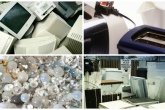ERP welcomes responsibility focus on WEEE as it passes 3m-tonne milestone
 More than three million tonnes of waste electrical and electronic equipment (WEEE) have now been collected and treated across Europe by the European Recycling Platform (ERP) since its foundation in 2002.
More than three million tonnes of waste electrical and electronic equipment (WEEE) have now been collected and treated across Europe by the European Recycling Platform (ERP) since its foundation in 2002.
The organisation was created in response to the European Union’s WEEE Directive to ensure that electronic waste is collected safely and operates in 15 countries across Europe.
The three million tonnes collected to date equates to the amount of WEEE generated by the entire EU in a whole year, and includes around 39 million televisions, 67.5 million small domestic appliances like irons and toasters, 12 million fridges and over 17 million washing machines. According to the organisation, ERP UK has provided the most material to the figure, recycling 599,432 tonnes, ahead of Germany (459,190 tonnes) and France (288,775 tonnes).
The amount of WEEE is growing across the world. 44.7 million tonnes were produced globally in 2016, with a Global E-waste Monitor report published by the UN’s International Telecommunications Union late last year predicting that e-waste levels will keep rising to a level of 52 million tonnes by 2021.
Allowing these materials to go to landfill risks hazardous substances contaminating soil and groundwater as well as losing valuable and dwindling resources vital for the running of electronic equipment.
The three million tonnes captured by the ERP will have prevented the emission of around 32.5 million tonnes of CO2, it predicts, and recovered some 24 tonnes of gold, 195 tonnes of silver and 240,000 of copper, as well as the rare earth elements that come in tiny, but essential, measures.

The increasing need to recover more of these materials and create a more sustainable and circular economy in the electronic industry could be aided by action by the EU to introduce legislation through its Circular Economy Package and a new Plastics Strategy, both of which ERP has welcomed, particularly the clear definition of roles and responsibilities for relevant stakeholders in the waste legislation and the introduction of extended producer responsibility for distance sellers, those that sell from one member state to another, which it says will combat free-riding and creating a level playing field among producers.
“ERP welcomes the EU initiatives to strengthen the principle of extended producer responsibility and to create competition in the waste market”, said CEO Umberto Raiteri. “Treating three million tonnes of WEEE shows that ERP has contributed significantly to the EU circular economy and proves that extended producer responsibility in a competitive environment brings huge benefits for the environment at reasonable cost to producers. It also promotes innovation, which leads to higher quality treatment – preventing the release of hazardous substances - and higher quality resources for the circular economy.”
However, the organisation also warns that the recent agreement lacks a clear definition of the organisational responsibilities of producers. This, it says, may hamper competition as producers may be bound in some member states to a specific producer responsibility organisation instead of being free to choose from multiple competing schemes.
More information about ERP can be found on its website.










